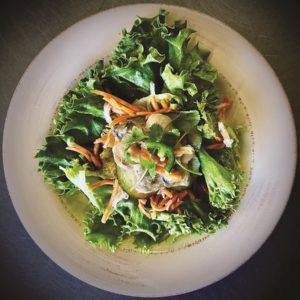She had me with oyster banh mi. If that’s what chef Bethany Gregory was making for lunch at the Soup Kitchen in Provincetown (SKIP), I wanted to meet her. From Dorchester to Da Nang, I’ve worked my way through plenty of banh mi stands. I even learned enough Rosetta Stone Vietnamese to place an order and thank the server — cam on, brother, cam on.
Anyone creating a new version of the French-Vietnamese sandwich — a baguette piled with crunchy cucumbers, pickles, herbs, and hot peppers — was already my hero. And this one featured roasted oysters.
Gregory and I meet over Zoom, she in her kitchen, bright with late winter light. She tells me about growing up on her grandparents’ farm in upstate New York, where she learned early on about making use of what was available from her family’s fields and local farm stands. Her grandmother called her the strangest of all her grandchildren — she was the one who would polish off peas or turnips but didn’t want steak.
In college, Gregory was a computer science major with little enthusiasm for technology. But a television advertisement for a cooking school in Pittsburgh got her attention. She enrolled before the commercial was over and has been cooking professionally for 30 years. “I’ve never not loved what I do,” Gregory says.
In 2016, Gregory was hired to helm the kitchen at SKIP, which has provided winter meals and companionship to residents of the Outer Cape since 1992. SKIP helps its patrons weather the bleak months with the aid of private donations and resources including the Greater Boston Food Bank, local farmers working with Sustainable CAPE, and local shellfish growers — in this case, organized through the Mass. Aquaculture Association and the Barnstable County Extension.
In the pandemic, the soup kitchen quickly switched to takeout service. And while some of the power of a communal meal was lost, Gregory and SKIP volunteers have found new ways to connect with patrons who drive through to pick up lunches.
There are always limits to cooking for a volunteer nonprofit kitchen. “At SKIP,” Gregory says, “I never really know what’s going to be available. I have to figure out what to do with what comes my way.” Last year, when Gregory received an offer of oysters from SPAT, the Wellfleet oyster promotion nonprofit, she paused: “I was hesitant because of the labor needed to shuck them.”
But Gregory is the determined type. She said “yes,” and used the oven to heat the oysters in bulk, making them a breeze to open. In February, when Gregory learned about a new donation of local oysters, the idea for the oyster banh mi came to her. “I love those flavors!” she says.
When it comes to cooking for the community, Gregory leans toward a plant-based diet and clean flavors. “I want the main ingredient — like here, the oyster — to be the star of the dish,” she says.
It’s also important to her that the food she serves meet the varied nutritional needs of SKIP guests. For that reason, at least before the pandemic, she made sure to spend time in the dining room, where she heard what patrons liked and didn’t like.
“At the same time,” Gregory says, “I ask people to be a little adventurous.” That said, she has been known to whip up well-loved dishes for patrons’ special occasions, such as when she recently prepared a liver paté favorite for Ilona Royce Smithkin’s 101st birthday.
Gregory depends on at least 11 daily volunteers to keep things running smoothly at SKIP and runs as tight a ship as she would in any professional kitchen. “Some people think I’m kind of militant,” she admits, “but what we’re doing is complex.”
Gregory chose to serve the SKIP banh mi in a lettuce leaf, which simplifies things by making it gluten free. It could also be served the traditional way, on a baguette. She prepared a vegan version by roasting oyster mushrooms in the same way she roasted the oysters — they were donated by Sustainable CAPE.
Gregory prefers San-J International Hoisin Sauce, which is gluten free, and Jade Mountain Oyster Sauce, and she uses prepared lemongrass paste that is found in the produce section of most supermarkets. Keep an eye on the oysters, Gregory warns: “If overcooked, they are rubber.” She roasts them quickly in a hot oven, just until they bubble slightly but are still moist.
Oyster Banh Mi
3 to 6 sandwiches, depending on the size of the oysters

Quick pickle slaw
¼ cup shredded carrots
¼ cup shredded daikon radish
¼ cup sugar
¼ cup rice wine vinegar
For the oysters
¼ cup peeled, minced ginger
¼ cup lemongrass paste
¼ cup bottled oyster sauce
1 pint shucked Wellfleet oysters
For the lettuce cups
1 head crisp leaf lettuce
1 seedless cucumber
The banh mi slaw
Bottled hoisin sauce
The roasted oysters
Cilantro sprigs
1 jalapeño pepper
Lime wedges
Preheat oven to 475 degrees F.
Combine all ingredients for the quick pickle slaw and marinate for at least 1 hour.
For the oysters, mix the ginger, lemongrass paste, and oyster sauce well, then gently toss together with the oysters in an oven-safe pan. Roast 5 minutes for smaller oysters and 8 minutes for larger ones, until the oysters are just bubbling at the edges but still appear moist.
For the lettuce cups, choose large lettuce leaves, wash and dry them. Slice the cucumbers thin. Trim and seed the jalapeños and slice them thin.
Place 1 large lettuce leaf on a plate and top with cucumber slices, slaw, a drizzle of hoisin sauce, 5 or 6 roasted oysters, cilantro sprigs, sliced jalapeño, and a squeeze of lime. Serve warm or at room temperature.
If you prefer, you can pile the whole collection of ingredients onto a baguette instead of the lettuce leaf.



